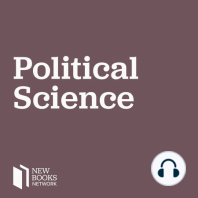62 min listen

Allison M. Prasch, "The World Is Our Stage: The Global Rhetorical Presidency and the Cold War" (U Chicago Press, 2023)
Allison M. Prasch, "The World Is Our Stage: The Global Rhetorical Presidency and the Cold War" (U Chicago Press, 2023)
ratings:
Length:
47 minutes
Released:
Oct 19, 2023
Format:
Podcast episode
Description
Allison M. Prasch, Assistant Professor of Rhetoric, Politics, and Culture at the University of Wisconsin-Madison, has a new book that focuses on the way that presidents used words, speeches, and international visits to communicate more than simple policy prescriptions during the Cold War period. This is a fascinating analysis and takes the reader through particular presidential visits to a variety of places—where the president’s symbolic quality as well as the words spoken communicate not only to the country or place visited, but also are communicating to American citizens back home as well as our antagonists in the Soviet Union and elsewhere. The World Is Our Stage: The Global Rhetorical Presidency and the Cold War (U Chicago Press, 2023) examines the ways in which the office of the American president—along with the individual inhabiting it—combines with the presentation of policy and rhetorical engagement to impact thinking about U.S. power abroad as well as at home. This is an important thesis and Prasch delineates a clear analysis of how this looked and operated during the Cold War, with five case studies that provide evidence and examples of how this actually worked.
The five case studies include President Harry S. Truman at Potsdam, President Dwight D. Eisenhower’s Good Will Tours, particularly in South America, President John F. Kennedy in West Berlin, President Richard M. Nixon’s trip/opening to China, and finally President Ronald W. Reagan in Normandy. Prasch weaves together historical, political, cultural, and rhetorical dimensions of each of these presidential events to understand the impacts and the reverberations for the United States, for the Soviet Union, for U.S. allies and enemies. She documents the ways in which some of these moves were responses to similar kinds of trips and events taken by Soviet leaders at the same time. Prasch has included deep archival research at presidential libraries and the like in order to flesh out the Oval Office discussions about these events—going through memos and interviews with presidential staff who were in charge of the planning and orchestration of the trips, the particular speeches, and the choices as to the venue and audiences.
The World is Our Stage: The Global Rhetorical Presidency and the Cold War is a crucial addition to the scholarship on rhetoric and the American presidency, moving beyond the words themselves and examining the multiple dimensions of presidentiality on display on the world stage when a president takes the opportunity to give a speech at a certain global venue. This analysis is particularly vital given the symbolic, performative, and policy import of these kinds of events.
Lilly J. Goren is a professor of political science at Carroll University in Waukesha, WI. She is co-host of the New Books in Political Science channel at the New Books Network. She is co-editor of The Politics of the Marvel Cinematic Universe (University Press of Kansas, 2022), as well as co-editor of the award winning book, Women and the White House: Gender, Popular Culture, and Presidential Politics (University Press of Kentucky, 2012). She can be reached @gorenlj.bsky.social
Learn more about your ad choices. Visit megaphone.fm/adchoices
Support our show by becoming a premium member! https://newbooksnetwork.supportingcast.fm/political-science
The five case studies include President Harry S. Truman at Potsdam, President Dwight D. Eisenhower’s Good Will Tours, particularly in South America, President John F. Kennedy in West Berlin, President Richard M. Nixon’s trip/opening to China, and finally President Ronald W. Reagan in Normandy. Prasch weaves together historical, political, cultural, and rhetorical dimensions of each of these presidential events to understand the impacts and the reverberations for the United States, for the Soviet Union, for U.S. allies and enemies. She documents the ways in which some of these moves were responses to similar kinds of trips and events taken by Soviet leaders at the same time. Prasch has included deep archival research at presidential libraries and the like in order to flesh out the Oval Office discussions about these events—going through memos and interviews with presidential staff who were in charge of the planning and orchestration of the trips, the particular speeches, and the choices as to the venue and audiences.
The World is Our Stage: The Global Rhetorical Presidency and the Cold War is a crucial addition to the scholarship on rhetoric and the American presidency, moving beyond the words themselves and examining the multiple dimensions of presidentiality on display on the world stage when a president takes the opportunity to give a speech at a certain global venue. This analysis is particularly vital given the symbolic, performative, and policy import of these kinds of events.
Lilly J. Goren is a professor of political science at Carroll University in Waukesha, WI. She is co-host of the New Books in Political Science channel at the New Books Network. She is co-editor of The Politics of the Marvel Cinematic Universe (University Press of Kansas, 2022), as well as co-editor of the award winning book, Women and the White House: Gender, Popular Culture, and Presidential Politics (University Press of Kentucky, 2012). She can be reached @gorenlj.bsky.social
Learn more about your ad choices. Visit megaphone.fm/adchoices
Support our show by becoming a premium member! https://newbooksnetwork.supportingcast.fm/political-science
Released:
Oct 19, 2023
Format:
Podcast episode
Titles in the series (100)
Sam Lebovic, "A Righteous Smokescreen: Postwar America and the Politics of Cultural Globalization" (U Chicago Press, 2022): An interview with Sam Lebovic by New Books in Political Science